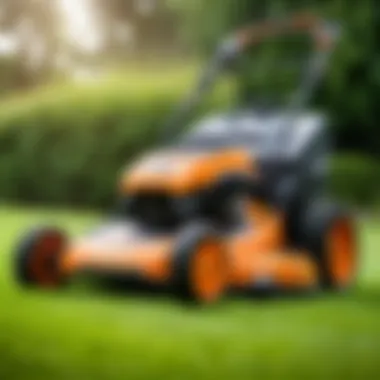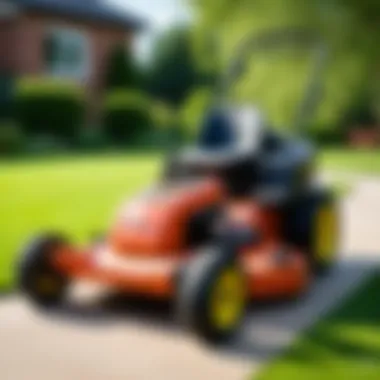Choosing Between Electric and Gas Lawn Mowers


Intro
Choosing the right lawn mower is a significant step for homeowners and landscaping enthusiasts alike. With options available in both electric and gas models, making the right decision requires careful contemplation of various factors. This guide comprehensively examines these factors and presents detailed comparisons, helping readers understand the merits and limitations of each type.
Electric lawn mowers are often praised for their environmental benefits and ease of use. On the other hand, gas-powered mowers are frequently recognized for their robustness and ability to tackle larger areas. The choice inherently depends on specific user needs, lawn size, and personal preferences. This article aims to dissect these contrasts, so individuals can confidently select a mower that best fits their situation.
Preamble to Lawn Mowers
Understanding the significance of lawn mowers is crucial for maintaining a healthy lawn. Lawn mowers represent a fundamental tool for homeowners and professionals alike. They enable effective grass cutting, ensuring not only the aesthetic value of your yard but also promoting the overall health of the grass.
When considering the right type of mower, choices extend mostly between electric and gas-powered models. Each option bears its own set of advantages and disadvantages which can significantly impact how one approaches lawn care.
Key Elements to Consider
Making an informed choice involves examining several specific factors:
- Performance: The effectiveness of different mowers in cutting grass and handling various terrains varies greatly.
- Maintenance Needs: Routine maintenance differs between electric and gas mowers. Understanding these needs can save time and expense in the long run.
- Environmental Considerations: More people than ever are mindful of their environmental impact. The ecological footprint of using gas versus electric options is significantly different.
Relevance of the Topic
In this guide, we will delve into the various aspects of both electric and gas lawn mowers. Knowledge about each type not only empowers consumers but can also inform purchase decisions that align with individual needs and values. Whether a homeowner values eco-friendliness over power, or is worried about maintenance versus convenience, this guide provides comprehensive insights to aid in that choice.
"A well-maintained lawn is not merely a visual treat but also provides a conducive environment for recreational activities. Choosing the appropriate mower is essential to achieve this goal."
By illuminating the features and functionalities of each lawn mower type, we aim to aid homeowners, DIY enthusiasts, and professionals in making informed, calculated decisions that will benefit their lawn care routines and align with their broader environmental values.
Understanding Lawn Mower Types
Understanding the various types of lawn mowers is crucial for anyone considering a purchase. It shapes how we approach our lawn care, influencing performance, maintenance, and even environmental impact. Each type has its unique characteristics and operational methods, which cater to differing user needs and lawn types. The distinctions between electric and gas lawn mowers will impact not only the functionality but also the overall experience of mowing, making this an essential topic.
In this section, we will delve deeper into two primary types: Electric Lawn Mowers and Gas Lawn Mowers. Both have their pros and cons, and awareness of these differences equips homeowners and landscapers alike with the information necessary to make an informed choice.
Electric Lawn Mowers
Electric lawn mowers are powered by electricity, either through a cord or via rechargeable batteries. They have gained popularity for various reasons.
- Quiet Operation: Electric mowers typically produce less noise compared to gas mowers, making them ideal for residential areas.
- Low Maintenance: These machines are generally easier to maintain. They do not require oil changes or fuel adjustments, which can save time.
- Weight: Electric models are often lighter. This may enhance maneuverability, particularly in tight spaces or uneven terrain.
- Cost-Effectiveness: Over time, electric mowers may have lower operating costs as electricity is often cheaper than gas.
"Choosing an electric mower can be a sustainable choice, balancing performance with environmental considerations."
However, electric mowers have some drawbacks. Their reliance on batteries means they may have limited runtime and power. Depending on the size of the lawn, users might need to recharge or switch out batteries frequently. Furthermore, the corded versions can limit mobility, as the reach may not cover larger properties effectively.
Gas Lawn Mowers
Gas lawn mowers operate on gasoline, providing a robust option for many users. They are known for their power and durability, making them a suitable choice for larger lawns.
- Powerful Performance: Gas mowers typically handle tougher grass and uneven ground better than electric mowers. They are designed for heavy-duty use.
- Endurance: These mowers can run for extended periods without the need for recharging. This feature is beneficial for larger properties.
- Versatility: Gas mowers come in various designs and sizes, catering to different lawn needs, from residential to commercial applications.
- Speed: Most gas models can mow swiftly compared to their electric counterparts, reducing mowing time.
While gas lawn mowers have many benefits, they also come with disadvantages. They are usually heavier and may require more upkeep, such as oil changes or spark plug replacements. Additionally, the noise levels can escalate, which may not be suitable in noise-sensitive neighborhoods.
Understanding these distinctions helps users assess their specific needs better. It facilitates a more deliberate choice between electric and gas mowers, aligning their decision with their lawn care requirements.


Performance Comparison
Understanding the performance characteristics of lawn mowers is paramount when deciding between electric and gas options. Performance encompasses various aspects such as efficiency in cutting grass, energy consumption over time, and the speed and power available for different tasks. Analyzing these elements ensures that the chosen mower suits both the landscape's needs and the user's preferences.
Cutting Efficiency
Cutting efficiency is a key indicator of a mower's performance. An efficient mower can trim grass evenly and effortlessly, which saves time and labor. Electric lawn mowers, generally quieter and producing less vibration, often deliver consistent cuts, especially in residential environments with lighter grass. They are suitable for small to medium yards.
In contrast, gas lawn mowers tend to excel in cutting thicker and taller grass due to their greater power. Their cutting decks usually provide wider blades that can handle tougher conditions, making them ideal for larger areas or overgrown lawns. However, users might face issues such as uneven cuts if the mower is not properly maintained or aligned.
To summarize:
- Electric Mowers: Suitable for smaller yards, producing even cuts with less noise.
- Gas Mowers: Better for larger or tougher lawns, providing more power for dense grass.
Battery Life vs. Fuel Efficiency
Battery life and fuel efficiency reflect the operational costs and time management of lawn care. Electric mowers generally rely on battery power, which influences how long the mower can operate before needing a recharge. The latest lithium-ion batteries provide decent run time but can still limit how big of an area can be mowed in a single session. Charging times may also lead to downtime, which could be considerable for larger lawns.
On the other hand, gas mowers offer the advantage of extended run times as they can operate as long as there is fuel. Refueling is a quick process, allowing for continuous mowing sessions without much delay. However, the fuel requirement can make gas mowers less environmentally friendly, and frequent refueling may incur additional costs over time.
Power and Speed
Power and speed significantly contribute to the efficiency of a lawn mower. Electric mowers are typically quieter and vibrate less, offering a more pleasant mowing experience but may lack the aggressive speed that some homeowners desire. Newer electric models are improving in this respect, matching speed with power.
Gas mowers, being more powerful, allow for faster mowing capabilities and often include features for adjusting cutting heights. This flexibility can be crucial when dealing with different types of grass or varied terrains.
Maintenance Requirements
Maintenance is a fundamental aspect of lawn care equipment management. When choosing between electric and gas lawn mowers, understanding the maintenance requirements of each type is crucial. These requirements can significantly affect the longevity, performance, and overall user experience of the mower. Electric mowers often require less intensive maintenance compared to their gas counterparts. However, both types come with specific tasks that ensure optimal operation and can avert costly repairs down the line.
Routine Maintenance for Electric Mowers
Electric lawn mowers are known for their simplicity and ease of use. Routine maintenance for these mowers focuses primarily on electrical components and cutting blades. The tasks involved are quite manageable for most homeowners.
- Blade Sharpening: It is essential to keep the blades sharp to ensure clean cuts and healthy grass. Inspect the blades regularly, and sharpen them at least once a season.
- Cleaning: After each use, clean the mower’s undercarriage. Removing grass clippings and debris prevents rust and promotes efficient functioning.
- Battery Care: For battery-operated models, ensure you follow correct charging procedures. Avoid overcharging to prolong battery life. If applicable, check connections to ensure they are secure.
- Inspect Cables: Regularly check for any signs of wear on the power cord. Inspect for frays or cuts that could affect performance or safety.
Electric mowers tend to have fewer issues requiring maintenance, making them an appealing option for those who prefer convenience.
Maintenance of Gas Mowers
Gas lawn mowers, while powerful, require more routine attention. Proper maintenance helps keep them running efficiently and extends their lifespan. The process involves various mechanical components that need regular care.
- Oil Changes: Just like any engine, gas mowers need their oil changed regularly. A typical rule is to change the oil every 50 hours of operation to keep the engine clean and lubricated.
- Spark Plug Replacement: Check and replace the spark plug as needed. A malfunctioning spark plug can affect starting and performance.
- Air Filter Inspection: The air filter prevents dirt and debris from entering the engine. Clean or replace it regularly, especially during the mowing season.
- Fuel System Maintenance: Use fresh fuel and consider adding a fuel stabilizer if the mower is not in use for an extended period. This helps prevent clogging and engine issues.
- Cleaning the Deck: After use, clean the mower deck. Grass buildup can cause corrosion and affect cutting efficiency.
Gas mowers demand more effort in maintenance, but the power and efficiency they provide can justify this extra commitment for many users. Understanding these requirements enables owners to maintain their mowers properly and enjoy effective and reliable lawn care.
Environmental Impact
The environmental impact of lawn mowers is an essential consideration for homeowners and users. As we aim for greener living, it is important to assess how our choices in lawn care equipment affect our surroundings. Lawn mowers contribute to air and noise pollution, while their fuel types also play a significant role in carbon emissions. The increasing focus on sustainability drives many individuals to seek eco-friendly options.
Understanding the environmental consequences of both electric and gas mowers helps consumers make informed decisions. Each option has its benefits and drawbacks, and the implications vary widely depending on use and local environmental conditions. Discussing emissions, energy consumption, and alternative innovations is significant for anyone planning to invest in a lawn mower.
Emissions of Gas Mowers


Gas lawn mowers are well-known for their emissions. They produce hydrocarbon pollutants that contribute to air quality issues. The exhaust from these mowers contains various harmful chemicals, including carbon monoxide and nitrogen oxides. This contributes to smog and can pose health risks, particularly for individuals with respiratory issues.
According to studies, one hour of operating a gas mower can emit as much pollution as driving a modern car for several hundred miles. This alarming fact urges users to consider the broader implications of gas mowers on air pollution and climate change. For those in urban areas, where air quality concerns are more pressing, switching to an alternative is even more essential.
Eco-Friendly Electric Alternatives
Electric lawn mowers present a cleaner option for homeowners. They produce zero emissions during operation, which means less harm to air quality. With advancements in battery technology, electric mowers have become increasingly efficient and capable of handling larger lawns. This shift towards electric alternatives reflects a growing awareness of environmental sustainability.
Not only do electric mowers reduce emissions, but many also operate more quietly than their gas counterparts. This results in less noise pollution, an often-overlooked aspect of environmental impact.
Moreover, renewable energy sources can power electric mowers, making them even more eco-friendly. Purchasing electric mowers or opting for battery-powered versions aligns with a commitment to reducing carbon footprints. In addition, many brands now produce models with recyclable materials, further enhancing their eco-friendly profile.
Cost Analysis
Cost analysis is a critical factor when deciding between electric and gas lawn mowers. It encompasses all financial considerations of ownership, from initial expenses to ongoing costs associated with maintenance and operation. Understanding these elements can significantly impact a homeowner's decision-making process.
In this section, we will explore two main areas: initial purchase costs and long-term operating costs. Each of these components offers crucial insights into how the choice of mower affects overall budget and value over time. Evaluating these costs in detail will enable users to make informed decisions aligned with their financial capabilities and lawn care needs.
Initial Purchase Costs
Initial purchase costs refer to the upfront amount required to buy either an electric or gas lawn mower. This expense can vary significantly based on several factors, including the brand, features, and specifications of the mower. Generally, electric lawn mowers tend to be more affordable than their gas counterparts. For example, common models like the Greenworks 40V or Sun Joe MJ401E-PRO can usually be purchased at a lower price point compared to gas mowers like the Honda HRX217 or the Toro Recycler.
When considering initial costs, it is also essential to factor in the quality of the mower. Higher price tags may correlate with better durability and performance, impacting long-term satisfaction. Additionally, some electric models may require an investment in battery replacements. This key consideration highlights the importance of not solely focusing on the initial price but also on the long-term value the mower provides.
Long-Term Operating Costs
Long-term operating costs involve the expenses incurred once the mower is in use. For gas mowers, these costs typically include fuel, oil changes, and maintenance, such as spark plug replacements and air filter cleaning. Fuel prices can fluctuate, affecting the overall expense. Users must regularly fill up the tank, which can add up, especially for larger lawns.
On the other hand, electric mowers have lower operating costs. They require less maintenance and do not need fuel. Instead, users may see a slight increase in electricity bills due to charging batteries, but this is often minimal compared to gas costs. Furthermore, many electric mowers now come with lithium batteries that have longer lifespans and provide more efficient charging.
Operating costs can also be evaluated in terms of time. Electric mowers may have fewer upkeep requirements, allowing homeowners to spend more time tending to their lawns rather than servicing their equipment.
In summary, evaluating initial purchase and long-term operating costs is essential when choosing between electric and gas lawn mowers. This analysis not only reveals the financial implications over time but also aids in assessing the overall value of each investment. Proper consideration of these factors will empower users with the knowledge needed to make choices that best fit their specific situations.
User Experience and Comfort
User experience and comfort play pivotal roles when selecting between electric and gas lawn mowers. For those who regularly maintain lawns, ease of use can significantly affect the overall satisfaction of the mowing experience. This section looks into various factors that contribute to user comfort and how they can influence your decision.
Noise Levels Comparison
Noise levels are an essential consideration. Electric lawn mowers are generally quieter than their gas counterparts. The humming sound of an electric mower can almost be soothing, making the task less of a chore. In contrast, gas mowers often emit loud noises that some users may find unpleasant. This distinction becomes even more vital in residential areas where noise ordinances may apply, and neighbors may be sensitive to excessive sound.
Studies have shown that prolonged exposure to loud noise can lead to hearing damage, so the quieter operation of electric mowers promotes a more comfortable mowing experience in the long term. Additionally, electric mowers can allow for early morning or evening use without disturbing the peace.
Weight and Maneuverability
Weight and maneuverability are critical factors in user comfort, particularly for those who have smaller yards or intricate landscaping. Electric mowers tend to be lighter than gas mowers. This characteristic makes them easier to push around and allows for simpler turns and positioning. For users with limited physical strength or those who are not accustomed to handling heavy equipment, electric mowers serve as a practical choice.
Gas mowers, while often more powerful, can be bulky and cumbersome. Their increased weight can lead to fatigue during operation, especially if a large lawn area needs to be covered. The difficulty of maneuvering in tight spaces can lead to frustration, as users may find it challenging to achieve a clean cut.
In considering the user experience, think about the layout of your lawn. If you have a lot of obstacles, such as flower beds or trees, an electric mower may offer the agility needed to navigate those areas comfortably. Ultimately, choosing the right mower aligns with personal preferences and specific lawn requirements.
Safety Considerations


Safety is a paramount concern when choosing between electric and gas lawn mowers. These machines can be dangerous if not used properly. Understanding the safety features and hazards associated with each mower type is crucial for any homeowner or DIY enthusiast. This knowledge not only protects the user but also ensures a more efficient and productive mowing experience.
Safety Features in Electric Mowers
Electric lawn mowers come equipped with multiple safety features designed to minimize risk while operating the machine.
- Automatic Shut-Off: Many models have an automatic shut-off feature that activates when the operator releases the handle. This prevents accidental startup, reducing risks during mowing and maintenance.
- Blade Guards: Electric mowers often include blade guards that protect users from accidental contact with the spinning blades. This design limits injury risk during regular usage and when mowing around obstacles.
- Lightweight Build: Electric mowers are typically lighter than gas models, making them easier to handle for many users. This can reduce fatigue and the likelihood of accidents due to loss of control.
These features contribute to a safer mowing environment, particularly for users who may be less experienced with lawn care equipment.
Handling Hazards of Gas Mowers
Gas lawn mowers, while powerful, pose unique hazards that necessitate precautionary measures.
- Fuel Management: Handling gasoline presents flammability concerns. It is essential to store fuel in a proper container, away from heat sources, and to avoid fueling the mower while the engine is hot.
- Maintenance and Repairs: Regular maintenance, such as checking the oil and replacing spark plugs, is necessary. Improper handling during these tasks can lead to accidents or equipment failure. Always turn off the mower before performing maintenance.
- Noise Pollution and Hearing Protection: Gas mowers can be quite loud, which may cause hearing damage over time. Using ear protection is advisable to mitigate this risk.
"Understanding the safety features of your lawn mower can prevent accidents and ensure a smooth mowing experience."
By comprehensively understanding the safety considerations surrounding both electric and gas lawn mowers, users can make informed choices. This understanding is key not only to optimize performance but also to create a safe working environment.
Market Trends and Innovations
The landscape of lawn mowers is evolving, influenced by advancements in technology, changing consumer preferences, and environmental concerns. Understanding the market trends and innovations in this field is essential for homeowners and DIY enthusiasts who want to make informed decisions regarding their lawn care choices. Staying updated on these trends not only ensures that users can select products that suit their needs but also provides insight into future developments that may influence the market. In this section, we will explore key advances in electric and gas lawn mowers.
Advancements in Electric Lawn Mowers
Electric lawn mowers are witnessing significant enhancements that improve user experience and efficiency. One major advancement is battery technology. Modern batteries, like lithium-ion variants, offer longer run times and faster charging capabilities. This means homeowners can mow larger lawns without interruption.
Additionally, features like smart technology integration are becoming more common. Many electric mowers now include sensors that adjust cutting height automatically. This technology ensures a uniform cut, optimizing both appearance and lawn health.
Furthermore, lightweight materials and ergonomic designs are making electric mowers easier to maneuver. This is particularly beneficial for users who may struggle with heavier models. The innovation in noise reduction is also notable; newer models operate at much lower noise levels compared to older versions, enhancing the user experience.
"The shift towards electric mowers reflects a broader trend in environmental responsibility and convenience, appealing to a modern consumer base that values sustainability and user-friendly technology."
Gas Mower Innovations
While electric mowers are gaining traction, gas mowers continue to see innovations that enhance their performance and appeal. One of the notable advancements is the development of engine efficiency. Newer gas engines not only provide more power but also reduce fuel consumption, addressing one of the common criticisms of gas mowers.
Moreover, manufacturers are introducing features like easy-start mechanisms and self-propelled systems. These innovations are aimed at reducing user effort and ensuring a more comfortable mowing experience.
There is also an increased focus on durability and reliability of gas mowers. Many brands are using advanced materials to construct more robust components, leading to longer lifespan and reduced maintenance needs.
This mix of performance and convenience keeps gas mowers relevant in a market increasingly leaning towards electric options.
Both electric and gas mowers are benefiting from innovations that cater to diverse user needs. Understanding these advancements helps consumers identify which type of mower aligns better with their specific requirements and preferences.
Closure
In making a choice between electric and gas lawn mowers, understanding the full scope is crucial. The article has navigated through a range of factors to consider, enabling informed decisions for homeowners and professionals alike.
Key elements discussed include performance characteristics of each mower type, maintenance demands, and their environmental impacts. These considerations are vital since they directly influence user experience and long-term satisfaction. For instance, electric mowers are often easier to maintain, while gas mowers provide a certain level of power and speed that can be necessary for larger yards.
Cost analysis has also been a significant part of this discussion. It is important to recognize both the initial purchase price and the long-term operating costs. While gas mowers might seem economical at first, their recurring fuel and maintenance expenses may add up over time.
Furthermore, safety is a critical concern that should be on every user’s mind. Electric mowers generally incorporate more safety features, reducing risks during operation. In contrast, gas mowers present handling hazards that must be carefully managed.
As market trends evolve, innovations in both types can change user preferences. Staying informed about advancements ensures that the chosen mower aligns not only with current needs but also with future expectations.
Ultimately, this guide aims to synthesize all factors to help you reach an educated judgment. The right decision depends on personal circumstances, including lawn size, maintenance preference, and budget. Thus, understanding the various aspects outlined provides a strong foundation for making a decision that meets both practical and financial objectives.







